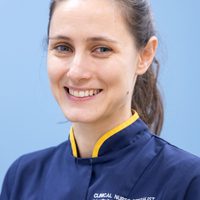Before you watch this webinar
Enhancing your learning experience begins with understanding you better. Collecting data enables us to tailor our educational content specifically for our audience. Discover more about how we handle your information in our Privacy Policy.
Event
Gastro-intestinal symptoms in neurological disease: from patient experience to best practice
Webinar objectives
- Understanding the pathophysiology mechanisms underpinning GI symptoms in neurological disease, and how this knowledge informs management
- Identifying the individual patients' needs with regard to gut function in a pan-enteric way
- Increasing knowledge of what best current practice is as well as pointing to emerging treatments
Webinar overview
Gut symptoms affect the majority of people with a range of neurological conditions, including spinal cord injury, multiple sclerosis, Parkinson's, neuromuscular disorders, spina bifida and stroke. Gut symptoms can present in form of constipation, faecal incontinence or a mix of both symptoms. Other pelvic floor and upper GI symptoms can also be present. Symptoms have a major impact to limit personal and social life reducing quality of life. In addition, they have a limiting impact on overall body function like nutrition. There are multiple mechanisms that can influence symptoms expression. Treatments are available and we will aim to provide a framework for participants to develop a viable local pathway to manage such gut dysfunction.

Summary
Faecal incontinence and constipation are common in people living with neurological conditions, and have a significant impact on quality of life (QoL).
In this webinar, Concetta Brugaletta, clinical nurse specialist, and Professor Anton Emmanuel, consultant neurologist at University College London (UCL) Hospitals NHS Foundation Trust, spoke about the importance of understanding and managing this often burdensome symptom.
Prevalence and impact
More than 90% of people with spinal cord injury (SCI) and almost 80% of people with multiple sclerosis (MS) experience constipation. Around 60% of SCI and MS patients report faecal incontinence, while smaller numbers, between 5% and 10%, suffer rectal prolapse.,,“Bowel dysfunction ruins QoL,” said Concetta, adding that bowel issues are among most bothersome issue for patients with neurogenic dysfunction. In addition, with bowel problems being a common cause of hospitalisation in this group, they can also lead to higher healthcare utilisation and costs.
Despite the impact, it is often poorly managed, and there is no clear referral pathway, said Concetta. “People see multiple clinicians and often go round in circles, receiving only conservative treatment that does not really address the challenge.” Anton added that while the symptoms are complex and “can be difficult to talk about”, there are interventions healthcare professionals (HCPs) can offer “without having to refer on to specialist services”.
Pathophysiology
The first step is understanding the pathophysiology, Anton went on. “The rectum fills throughout the day, and, at a critical point of fullness, it goes from being a capacitance vessel to a pressure vessel. That pressure is what your brain senses as an urge,” he explained.
A SCI, or lesion, above the T12 vertebra would typically result in reflux bowel, where there is a loss of the sensation of fullness. There is high rectal pressure, and high pressure at the anal sphincter causes it to open as a reflex to rectal fullness. Reflex bowel, then, predisposes the patient to inappropriate emptying. Where the lesion is below the T12 vertebra, the result tends to be flaccid bowel. Again, there is loss of the fullness sensation, but there is low rectal and anal sphincter pressure, predisposing the patient to bowel soiling.
Anton also outlined the difference between healthy and constipated motor activity. He explained that healthy bowels experience a cycle of antegrade propagating sequences (PS)throughout the day, clustered after eating, with little activity while sleeping. Those with slow transit constipation, however, do not experience the post-meal antegrade PS clusters. (see fig 1)
Healthy individuals will retain around 1kg of stool in the bowel after a movement, but this will be higher in those with neurogenic bowel.
Screening and assessment
It is important to note that GI symptoms go beyond the bowel. If a patient presents with nausea/vomiting, early satiety, reflex, pain, or bloating, HCPs should consider constipation, said Anton.
Concetta presented a range of potential screening questions that could help HCPs identifypatients experiencing bowel dysfunction, and understand the symptom’s impact on QoL.
- Overview: Are you bothered or limited by your bowel?- Constipation: Are you concerned about how often or how long it takes to open your bowel?- Faecal incontinence: Do you ever have difficulty controlling your bowel?- Impact: Do you take any medications or adjust your diet to manage your bowel?- Burden: Do you have to limit your activities because of your bowel?
“As you talk to the patients about this, you unmask a huge amount of silent burden,” said Anton. “They often don't talk about the shame of being dependent, or the fact that they can't function socially because of the unpredictability of their bowel. These things very quickly tumble out once you open the door.”
In terms of assessment, Concetta suggested the “patient-friendly, strongly validated” Bristol Stool Chart. For more formal evaluation, the Neurogenic Bowel Dysfunction Score, which is closely correlated with QoL, can be useful, though some sections are specific to people with CSI. The UCL team is working on a MS-specific assessment tool, called Gaining Insight into Gastroenterological Symptoms in MS, or GIGI. “We are currently in the evaluation phase,”said Concetta.
Treatment and management
The care algorithm of neurogenic bowel dysfunction starts with conservative options. These include diet/fluid intake and lifestyle adjustments, and laxative or constipating medications, and, if needed, digital stimulation, suppositories, or biofeedback. “The bulk of patients can be managed with conservative options,” said Anton.
If these approaches prove unsuccessful, the next step would be the minimally invasivetransanal irrigation. However, more invasive interventions may be required, from sacral nerve stimulation or antegrade colonic irrigation, to sacral anterior root stimulation and, in extreme cases, stoma.
The correct approach will be guided by the individual, said Anton, recommending HCPs devise a “treatment menu” based on the person’s history and symptoms. The “menu” would include conservative approaches, first-, second-, and third-line medicines, and specialist interventions, as well as inappropriate, contraindicated, or ineffective interventions.
“Whether they primarily have a problem with transit, evacuation, incontinence, or urgency,” said Anton, “there are things you can do before you get to the specialist interventions at the bottom of the menu.”
CPD accreditation
This webinar has been approved by the Federation of the Royal Colleges of Physicians of the United Kingdom for 1 category 1 (external) CPD credit(s).


